新版人教新目标七年级下册unit2 4时
人教版新目标七年级英语下册 Unit 2教学设计

人教版新目标七年级英语下册 Unit 2教学设计一. 教材分析人教版新目标七年级英语下册Unit 2主要围绕日常生活话题,让学生学会描述日常活动、表达喜好和计划。
本单元包括三个部分:听说课、读课和综合语言运用课。
听说课主要训练学生的听说能力,读课通过阅读提高学生的理解能力,综合语言运用课则培养学生的综合语言运用能力。
二. 学情分析七年级的学生已经掌握了基本的英语语音、词汇和语法知识,具备一定的听说读写能力。
但部分学生对英语学习仍存在恐惧心理,缺乏自信心。
因此,在教学过程中,教师需要关注学生的情感态度,激发他们的学习兴趣,提高课堂参与度。
三. 教学目标1.知识目标:学生能够掌握日常生活中常用的词汇和表达方式,如goto school, read books, watch TV等。
2.能力目标:学生能够在真实情境中运用所学知识进行日常交流,提高听、说、读、写的能力。
3.情感目标:学生能够积极参与课堂活动,提高学习英语的自信心和兴趣。
四. 教学重难点1.重点:学生能够熟练运用日常词汇和句型描述日常生活。
2.难点:学生能够正确使用一般现在时表达习惯性动作和喜欢的事物。
五. 教学方法1.任务型教学法:通过完成各种实际任务,让学生在实践中学习、运用英语。
2.情境教学法:创设真实的语境,激发学生的学习兴趣和积极性。
3.情感教学法:关注学生的情感需求,营造轻松、愉快的学习氛围。
六. 教学准备1.教师准备:提前备课,熟悉教材内容和教学目标。
2.学生准备:预习新课内容,复习相关知识点。
3.教学资源:准备多媒体教学课件、图片、实物等。
七. 教学过程1.导入(5分钟)利用图片或实物展示日常生活中的人物和活动,引导学生谈论他们的日常喜好。
例如,展示一张学校操场上的图片,让学生描述图片中学生在做什么。
2.呈现(10分钟)教师通过PPT展示本节课的主要词汇和句型,如go to school, read books, watch TV等,并用例句展示如何运用这些词汇和句型。
七年级英语Go_for_it!_Unit_2_说课稿课件人教版新目标

三、教学目标
1、语言知识 词汇: A、重点掌握表示建筑物种类的名词, 如post office, hotel, bank, supermarket, street, pay phone, avenue, B、掌握如下描绘性形容词及方位副词,如 clean, quiet, dirty, busy, right, left, down, along, C、方位介词,如next to, across from, in front of, near, between, behind D、短语,如 turn right, turn left, go down, go straight on, walk along, go along,
2、教材的地位及其作用 、 本单元的教学主要内容是:学习“问路指路”的 常用表达方式 ,该话题与学生的日常生活紧密 联系在一起,容易唤起学生的学习兴趣,这对 于提高学生的综合能力很有帮助,特别是说的 能力。通过本单元的学习描述某一建筑物的位 置,学会问路,指路,学会利用地图描述某一 社区。 本单元继续使用一般现在时,这是一个生活中离 不开的时态,也是最基本的一个时态。新课程 标准要求学生重点掌握一般现在时,这在英语 中使用频率很高,学好这一时态的用法对以后 其他时态的学习和交际有很大的帮助。
Students listen to teacher’s instruction and draw out the maps:
Map 1: Across from the bank is a supermarket. There is a post office between the library and the supermarket. Across from the supermarket is a park. Next to the park is a restaurant. Map 2: A library is next to the park. Across from the park is a bank. Next to the bank is a post office. Across from the post office is the restaurant, which is across from the supermarket.
人教新目标Go For It! 初中英语七年级下册Unit 2 What time do you go to school$%Section A导学案(2)
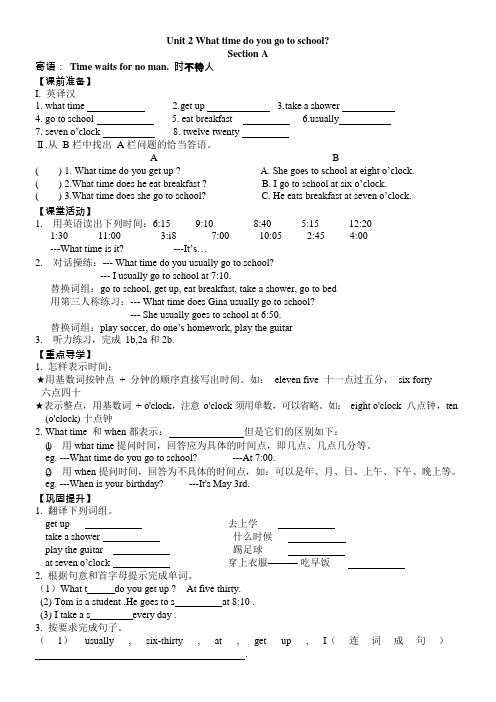
Unit 2 What time do you go to school?Section A寄语:Time waits for no man. 时不待人【课前准备】I.英译汉1.what time2.g et up3.t ake a shower4.go to school 7. seven o’clock5. eat breakfast8. twelve twentyuallyⅡ.从 B 栏中找出A 栏问题的恰当答语。
A B( ) 1. What time do you get up ? A. She goes to school at eight o’clock.( ) 2.What time does he eat breakfast ? B. I go to school at six o’clock.( ) 3.What time does she go to school? C. He eats breakfast at seven o’clock.【课堂活动】1. 用英语读出下列时间:6:15 9:10 8:40 5:15 12:201:30 11:00 3:i8 7:00---What time is it? ---It’s…10:05 2:45 4:002.对话操练:--- What time do you usually go to school?--- I usually go to school at 7:10.替换词组:go to school, get up, eat breakfast, take a shower, go to bed用第三人称练习:--- What time does Gina usually go to school?--- She usually goes to school at 6:50.替换词组:play soccer, do one’s homework, play the guitar3.听力练习,完成1b,2a 和2b.【重点导学】1.怎样表示时间:★用基数词按钟点+ 分钟的顺序直接写出时间。
七年级英语下册Unit2Whattimedoyougotoschool短语语法知识点汇总新版人教新目标版
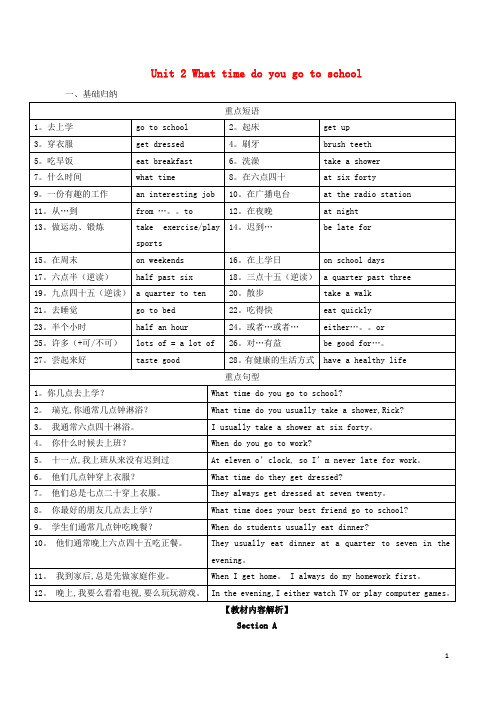
Unit 2 What time do you go to school 一、基础归纳【教材内容解析】Section A1.get dressed (P。
7)get dressed意为“穿上衣服”,dress用作动词,表示“给(某人)穿衣服”,接宾语时,只能接表示人的名词或者代词。
He can’t dress himself。
I usually dress my daughter before I go to work。
【拓展】辨析wear, put on和dress2.take a shower (P。
7)take a shower意为“洗淋浴”,相当于have a shower,shower用作名词,表示“淋浴”。
I often take a shower in the evening。
I take a cold shower when I feel tired。
3.What time do you usually get up, Rick? (P。
7)(1)what time用来询问具体的时间点,表示“什么时候”。
What time do you go to school?(2)usually是频度副词,意为“通常、一般”,在句中作状语,一般位于实义动词之前,连系动词be、助动词或者情态动词之后。
I usually have lunch at school。
He usually goes to school by bike。
4.I never get up so early。
(P。
8)early此处用作副词,表示“很早地”,反义词为late,意为“晚地”。
Please come to school early tomorrow。
【拓展】early还可以用作形容词,表示“早的、提前的”,反义词是late,意为“晚的”。
He gets up early to catch the early bus。
人教版(新目标)初中英语七年级下册Unit 2预习自学

Unit 2单词(音标)up [ ʌp] adv. 向上get up 起床;站起dress [ dres] v. 穿衣服 n. 连衣裙getdressed 穿上衣服brush [ brʌʃ] v. 刷刷净 n. 刷子tooth [ tuːθ] n. ( pl. teeth[ tiːθ]) 牙齿shower [ ' ʃaʊə]n.& v.淋浴n. 淋浴器(间)take a shower 洗淋浴usually [ ' ju: ʒuəli] adv. 通常地;一般地forty [ ' fɔ:( r) ti] num. 四十wow [ waʊ] interj.(表示惊奇或敬佩)哇;呀never [ ' nevə( r)] adv. 从不;绝不early [ ' ɜːlɪ]adv.& adj. 早(的)f i fty [ ' f ɪ ftɪ]num. 五十job [ dʒɒb], [ dʒɑːb] n. 工作;职业work [ wɜːk] v. & n. 工作station [ ' steɪʃn] n. 电( 视) 台;车站radio station 广播电台o' clock [ ə' klɒk], [ ə' klɑ: k] adv.(表示整点)…… 点钟night [ naɪt] n. 晚上;夜晚funny [ ' fʌnɪ] adj. 奇怪的;滑稽好笑的exercise [ ' eksəsaɪz]v.& n. 锻炼;练习on weekends ( 在) 周末best [ best] adj. 最好的 adv. 最好地;最group [ gruːp] n. 组;群half [ hɑːf], [ hæf] n. & pron. 一半;半数past [ pɑːst],[ pæst]prep. 晚于;过(时间) adj. 过去的quarter [ ' kwɔː( r) tə( r)]n. 一刻钟;四分之一homework[' həʊmwɜː( r) k] n. 家庭作业do( one’ s) homework 做作业run [ rʌn] v. 跑;奔clean [ kliːn]v. 打扫;弄干净 adj. 干净的walk [ wɔːk]n.& v. 行走;步行take a walk 散步;走一走quickly [ ' kwɪkli] adv. 很快地either [ ' aɪðə( r)], [ ' iː ðə( r) ] adv. 或者;也(用在否定词组后)either… or…要么……要么……;或者……或者……lot [ lɒt], [ lɑ: t] pron. 大量;许多lots of 大量;许多sometimes [ ' sʌmtaɪmz] adv. 有时taste [ teɪst]v. 有……的味道;品尝 n. 味道;滋味li fe [ laɪf]n. 生活;生命Rick [ rɪk] 里克(男名)Jim [ dʒɪm] 吉姆(男名)Scott [ skɒt], [ skɑ: t] 斯科特(男名)Tony [ ' təʊnɪ] 托尼(男名)unit2电子课本Liaten and match the timea with the actions. Draw lines from the clocksto the pictures.Snident A ie the interviewer. Student B is Rick. Ask amd axxswerquestions about Rick's day.A: V 'ha c t tim dci yo u usually take a s lioive r, Rick * B : 1 us my take a sh never aI s ix fo rty.Match theactivi£ics wiEts tJze pictures.1. ,lot up c?. gn tn sChnnlri t si x i hi r r yWhos tiry›c dg ypuusmlly get up7Jim hassisters. Jim’s familyhas _ xhuxvcr.Ltccers agaJxs. Cossp!ete tbe shower schedcsle £orJiza*c fiuoJ3y'.Tims5:3¢linterviewer: -$cott has an inrcrext ing jrib. He wcirks at a radiri station.Scott, what time is your radio show?Ston: Interviewer: Scott:From bvelve o’clock at night to six oklock in the morning. What time do you usually get up?At eight thirty at night. ”thenI eat breakfast at nine.Interviewer: ‘Heat s a ftnftf¥y titTte fOr t›renkfast!S‹ort:Scoti:Yeah. After that, I usually exercise at a1›nut ten twenty. then do you go to «'ork?At 4•levcn t3’clock, .*cl I 'mnever late for work.tøte on •<cłændsüh< țjr î3 uc u14.Anna never eats breakfast.S. What rime does your be3t Friend go to sckooł7When do students usually do these things? h4atchthe activitie.s tenth the time of day..i .jiiartcr i‹› ten ii* ila.Check your answers with your partner.sListen rind circle the activities yuu hear.g= =p 5: 30.1. eat \ realm:1st 4. ¿u tu choul. in hnmc7. clcan i riy rel t3It1G. eat ‹4in n er9. t.Ake a is' all 1 O. t;ci ter b c dListen agatn. Wrtte Mtc titres text to tbe actioicies yotz circled In 1 c.AkandanswerquesConsaboutlom. ’Unit2 知识梳理◆短语归纳1.what time 几点2.go to school 去上学3.get up 起床4.take a shower 洗淋浴5.brush teeth 刷牙6.get to 到达7.do homework 做家庭作业8.go to work 去上班9.go home 回家10.eat breakfast 吃早饭11.get dressed 穿上衣服12.get home 到家13.either…or…要么…要么…14.go to bed 上床睡觉15.in the morning/afternoon/evening 在上午/下午/晚上16.take a walk 散步17.lots of=a lot of 许多,大量18.radio station 广播电台19.at night 在晚上20.be late for=arrive late for 迟到◆用法集萃1.at + 具体时间点在几点(几分)2.eat breakfast/lunch/dinner 吃早饭/午饭/晚饭3.thirty/half past +基数词…点半4.fifteen/a quarter to +基数词差一刻到…点5.take a/an+名词从事…活动6.from…to…从…到…7.need to do sth 需要做某事◆典句必背1.—What time do you usually get up? 你通常几点钟起床?—I usually get up at six thirty. 我通常6:30起床。
七年级英语下册Unit2Whattimedoyougotoschool教案新版人教新目标版
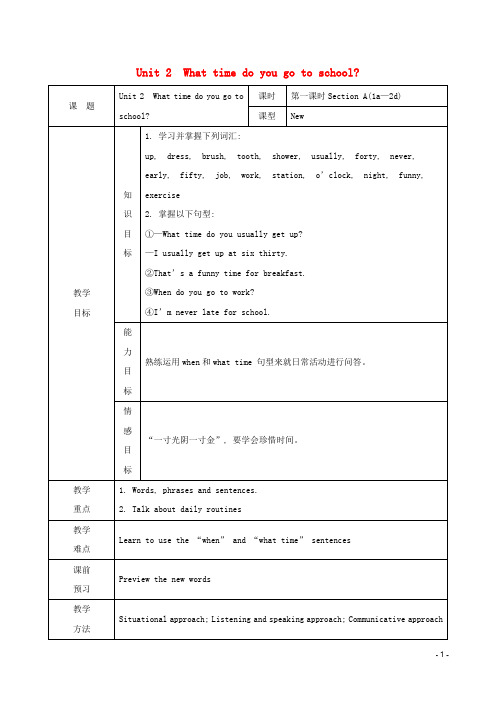
②When does Scott go to work?
③He always goes to work at seven o’clock.
能力目标
1.掌握What time及When特殊疑问句及其答语。
2.熟练使用频度副词
Summarize how to use what time to ask about their daily activities.
培养学生探究、归纳总结能力。
续表
教学环节
教师活动
学生活动
备课札记
Step 8
Consolidation
教师设置巩固检测练习:
Ⅰ.用所给词的适当形式填空
1. What time do you getdressed(dress) every morning?
2. Ss talk about themselves in pairs.
通过利用“信息差”进行口语结对活动,在交流信息过程中,进行真实的交际问答活动。
Step 6
Role-play (2d)
1. Let Ss read the conversation of 2d and answer the questions below.
2. Play the tape of2a.
3. Let Ss look at the chart of 2b carefully.
4. Play the tape of 2b.
1. Ss read the sentences in the box in2abefore listening to the tapபைடு நூலகம்.
人教新目标七年级英语下册Unit 2What time do you go to school课时分层训练
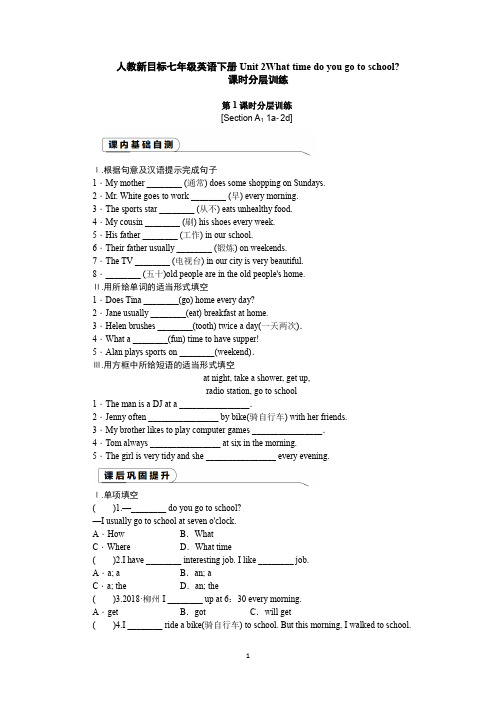
人教新目标七年级英语下册Unit 2What time do you go to school?课时分层训练第1课时分层训练[Section A1 1a2d]Ⅰ.根据句意及汉语提示完成句子1.My mother ________ (通常) does some shopping on Sundays.2.Mr. White goes to work ________ (早) every morning.3.The sports star ________ (从不) eats unhealthy food.4.My cousin ________ (刷) his shoes every week.5.His father ________ (工作) in our school.6.Their father usually ________ (锻炼) on weekends.7.The TV ________ (电视台) in our city is very beautiful.8.________ (五十)old people are in the old people's home.Ⅱ.用所给单词的适当形式填空1.Does Tina ________(go) home every day?2.Jane usually ________(eat) breakfast at home.3.Helen brushes ________(tooth) twice a day(一天两次).4.What a ________(fun) time to have supper!5.Alan plays sports on ________(weekend).Ⅲ.用方框中所给短语的适当形式填空at night, take a shower, get up,radio station, go to school1.The man is a DJ at a ________________.2.Jenny often ________________ by bike(骑自行车) with her friends.3.My brother likes to play computer games ________________.4.Tom always ________________ at six in the morning.5.The girl is very tidy and she ________________ every evening.Ⅰ.单项填空()1.—________ do you go to school?—I usually go to school at seven o'clock.A.How B.WhatC.Where D.What time()2.I have ________ interesting job. I like ________ job.A.a; a B.an; aC.a; the D.an; the()3.2018·柳州I ________ up at 6:30 every morning.A.get B.got C.will get()4.I ________ ride a bike(骑自行车) to school. But this morning, I walked to school.A. neverB. hardlyC. seldomD. usually()5.We usually get________ quickly in the morning.A.dress B.dressingC.dresses D.dressed()6.Mrs. Smith eats breakfast ________ night. It's a funny time ________ breakfast. A.in; for B.at; ofC.in; of D.at; for()7.Jane always gets up early, so she's never late ________ work.A.at B.with C.for D.on()8.—What's the time?—________ nine fifteen.A.That is B.It'sC.These are D.This isⅡ.句型转换1.My mother runs at__six every morning.(对画线部分提问)________ ________ ________ your mother________every morning?2.My uncle usually has lunch at__home.(对画线部分提问)________ ________ your uncle usually________ lunch?3.My father watches__TV every day.(对画线部分提问)________ ________ your father________ every day?4.Mr. Wang exercises in the morning.(改为否定句)Mr. Wang ________ ________ in the morning.5.He usually takes a shower at six thirty.(改为一般疑问句)________ he usually ________ a shower at six thirty?第2课时分层训练[Section A2 3a3c]Ⅰ.用恰当的介词填空1.Jill plays volleyball ________ weekends.2.We usually get up at six ________ school days.3.Rick has breakfast ________ about seven o'clock.4.I often get ________ school early.5.Anna is never late ________ class.6.Mr. Brown works ________ a radio station.7.The man writes stories ________ night and sings ________ the morning.8.We play games from ten ________ twelve.9.They always play chess ________ school.10.It's a funny time ________ dinner.Ⅱ.根据汉语意思完成句子,每空一词1.“现在几点钟?”“七点半。
人教新目标七年级英语下册 课时练习 Unit2 第四课时Section B(2a-3d) 含答案

课时训练 Unit 2第四课时Section B (2a-3b)一、根据句意和首字母或汉语提示填单词。
1. (有时)I go to the old people's home.2. My little sister e takes a walk or plays chess with my father after dinner.3. --Thanks a- You’ re welcome.4. The chicken ( 尝起来) delicious (可口的).5. People think cats have nine (生命).二、用所给词的适当形式填空。
1. He goes to school after he eats breakfast (quick).2. Either you or Mike (tell) stories to us.3. There are lots of ( apple) in the bag.4. The ice - cream tastes ( well).5. My grandparents have a ( health) life.三、单项选择。
( )1.They go to work after breakfast every day.A./ ;theB./;/D. a;a( )2.I do my homework six -thirty my brother.A. at;withB. at ;atC. with;withD. with;at( )3. Mary always runs half an hour in the morning.A. forB.atC. onD. in( )4. Mike doesn't want to walk home, and Bob doesn't, 。
A. alsoB. eitherC. tooD. then( )5. Music is good our life, and my friendLily is good music.A. at ;forC. with ;forD. at ;with四、根据汉语意思完成句子,每空一词。
Unit2知识点讲解人教版英语七年级下册

1.英语钟点时刻的表达在英语中,钟点时刻的表达除了用阿拉伯数字(如8:10,12:45)外,还可以用以下几种表达方式。
◆当时间是整点时,可用“钟点数+o'clock”来表达,其中o'clock可以省略。
如:6:00 → six (o'clock) 11:00 → eleven (o'clock)◆当时间不是整点时,表达方式有以下两种:1. 钟点数+分钟数。
如:9:08 → nine eight 14:40 → fourteen forty2. 分钟数+ past / to +钟点数1) 当分钟数小于30时,用“分钟数+ past +钟点数”表示“几点过几分”。
如:8:09 → nine past eight7:25 → twentyfive past seven2) 当分钟数大于30时,用“(60-分钟数) + to +下一个钟点数”表示“差几分到几点”。
如:11:40 → twenty to twelve 2:58 → two to three注意:在分钟数中,15分钟还可以用a quarter表示,30分钟还可以用half来表示。
如:11:15 → a quarter past eleven8:45 → a quarter to nine13:30 → half past thirteen◆ A.M.(a.m.)和P.M.(p.m.)在12小时制中,我们可以用A.M.(a.m.)和P.M.(p.m.)来区分上、下半天。
A.M.(a.m.)意为“午前、上午”; P.M.(p.m.)意为“午后、下午”。
如:早上六点半→ 6:30 a.m. / half past six in the morning中午十二点→ 12:00 p.m. / 12 o'clock in the daytime午夜十二点→ 12:00 a.m. / 12 o'clock at night / at midnight【运用】用两种方式写出下列时间的英语表达1. 2. 3.___________________ 或___________________ ___________________或______________________________________或___________________参考答案1. four thirty; half past four2. eleven five; five past eleven3. nine fifteen; a quarter past nine2. what time & when 引导的特殊疑问句what time和when均可对时间状语进行提问,用来询问什么时间。
人教新目标七年级下册英语导学案Unit 2 What time do you go to school

承德四中年级学科导学案.主备人:审核人:审批人:编号:课题:Unit 2 What time do you go to school? 第一课时课型:听说课第一标:设置目标(5分钟)【学习目标】知识目标1:能掌握以下单词和短语:up, dress, brush, tooth (pl. teeth), shower, get up, get dressed, brush teeth,take a shower, go to school, eat breakfast2.能掌握以下句型:①—What time is it? —It’s ….②—What time do you usually get up? —I usually get up at six thirty.③—What time does Bob usually get up? —He usually gets up at five thirty. 第二标:达成目标(25分钟)学法指导1.Pairwork(要求学生两人一组练习。
): —What time is it? —It’s ….2. 听录音,完成活动1b,把时间与活动的匹配(组内检查)。
3.谈论日常生活:—What time do you usually get up? —I usually get up at six thirty.4.听录音,完成活动2a,2b(组内检查)。
小组内复述Jim一家的淋浴时间,第三标:反馈目标(15分钟)一. 根据汉语写单词、短语:起床_______________穿上衣服___________________洗淋浴_________________刷、刷净__________________牙齿(单、复数形式)________ __________二、翻译句子:Time is money. Time is life. Time flies. ______三. 单项选择:( )1. Tony usually gets up___5 o’clock. A. in B. at C. on D. about ( )2. —W hat’s the English for 8:10? —It’s ______.A. eight tenB. ten eightC. ten to eightD. eight past ten( )3. He_____up at 7:00 and_____the early morning news(新闻) on TV.A. gets, seesB. get, watchC. gets, watchesD.get, see( )4. What time _______she_______?A. do, go to schoolB. does, goes to schoolC. does, go to the schoolD. does, go to school( )5. _______does your father usually ____ a shower?A. What time, takesB. What’s time, takeC. What time, ta keD. What’s time, takes( ) 6.He gets up early. So he has ______ time for breakfast.A. manyB. a lotC. lots ofD. lot of四、句型转换。
七年级英语下册《Unit2 What time do you go to school Period 2》人教新目标版

七年级下册Unit2 What time do you go to school? 导学案 Period2【学习目标】1.知识目标:巩固表示日常作息的词汇。
2.技能目标:熟练表达自己一天作息情况。
3.情感目标:培养学生良好的生活习惯。
【学习重难点】熟练掌握表达一天作息的句型。
【学习过程】:一、自主复习1.试翻译下列句子。
你每天什么时候起床?______________________________________________我每天六点穿衣。
___________________________________________________她每天六点十分刷牙。
______________________________________________他总是七点半吃早饭。
______________________________________________他每天晚上八点洗澡。
______________________________________________二、对话练习听2d录音跟读模仿。
Pair work 两人展示:Interviewer: Scott has an interesting job. He works at a radio station.Scott, what time is you r radio show?Scott: From twelve’s o’clock at night to six o’clock in the morning. Interviewer: What time do you usually get up?Scott: At eight thirty at night. Then I eat breakfast at nine. Interviewer: That’s funny time for breakfast.Scott: Yeah. After that, I usually exercise at about ten twenty. Interviewer: When do you go to work?Scot t: At eleven o’clock, so I’m never late for work.Group work: 小组合作:调查本组内成员信息,展示调查结果。
Unit 2 英语教案人教版新目标七年级英语下册

Unit 2 what time do you go to school?(Section A)教学目标:能够听懂、会说并正确使用日常生活中的时间表达方式。
能够用英语描述自己或他人的日常作息时间。
教学重点:时间表达方式。
熟练使用句型“What time do you...?”和“I usually... at...”。
教学难点:用英语描述自己或他人的日常作息时间。
区分at、in、on的用法。
教学准备:课件、多媒体设备。
钟表、日常生活用品图片等教具。
教学过程:Step 1: Warm-upShow some pictures of daily activities, such as getting up, having breakfast, going to school, doing homework, watching TV, and going to bed.Ask students to describe what they usually do at each time of day.Step 2: PresentationPresent some common time expressions, such as "in the morning", "in the afternoon", "in the evening", "at night", "at 6 o'clock", "at 7:30", and "on Monday".Explain the different uses of "at", "in", and "on".Step 3: PracticeHave students work in pairs to ask and answer questions about each other's daily routines using the sentence pattern "What time do you...?" and "I usually... at...". For example: "What time do you get up? I usually get up at 6:30."Ask some students to share their partners' routines with the class.Step 4: ProductionHave students work in pairs or small groups to create a schedule of their own daily routines.Ask some students to share their schedules with the class.Step 5: Culture CornerShow students a map of the world with different time zones marked on it.Explain how time zones work and the difference between a single time zone country like China and a multi-time zone country like the United States.Step 6: HomeworkAssign students to write a short paragraph about their own daily routines using the sentence pattern "I usually... at...".Encourage students to use the time expressions and sentence patterns they have learned in class.教学反思:本课重点介绍了日常生活中常用的时间表达方式和句型,通过让学生在实践中运用这些表达方式和句型,巩固了他们的学习成果。
人教版新目标go for it 七年级下册Unit 2单词拼写,课文填空和知识点梳理
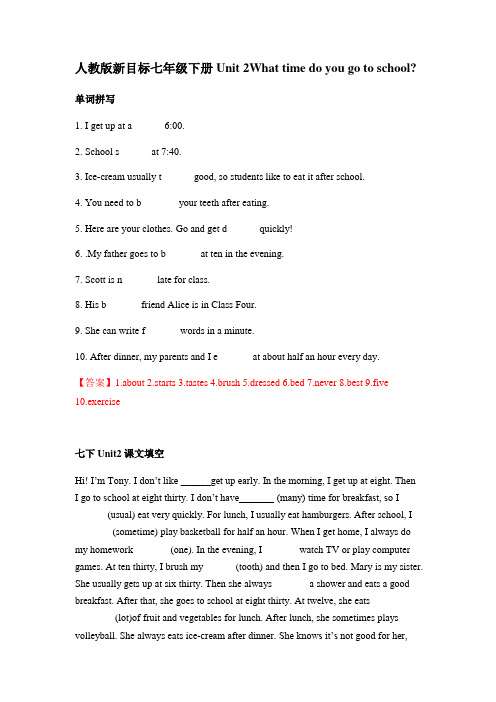
人教版新目标七年级下册Unit 2What time do you go to school? 单词拼写1. I get up at a______ 6:00.2. School s______ at 7:40.3. Ice-cream usually t______ good, so students like to eat it after school.4. You need to b_______ your teeth after eating.5. Here are your clothes. Go and get d______ quickly!6. .My father goes to b_______at ten in the evening.7. Scott is n_______late for class.8. His b_______friend Alice is in Class Four.9. She can write f_______words in a minute.10. After dinner, my parents and I e_______at about half an hour every day.【答案】1.about 2.starts 3.tastes 4.brush 5.dressed 6.bed 7.never 8.best 9.five10.exercise七下Unit2课文填空Hi! I’m Tony. I don’t like ______get up early. In the morning, I get up at eight. Then I go to school at eight thirty. I don’t have_______ (many) time for breakfast, so I______ (usual) eat very quickly. For lunch, I usually eat hamburgers. After school, I _______ (sometime) play basketball for half an hour. When I get home, I always do my homework _______(one). In the evening, I_______ watch TV or play computer games. At ten thirty, I brush my______ (tooth) and then I go to bed. Mary is my sister. She usually gets up at six thirty. Then she always _______a shower and eats a good breakfast. After that, she goes to school at eight thirty. At twelve, she eats________(lot)of fruit and vegetables for lunch. After lunch, she sometimes plays volleyball. She always eats ice-cream after dinner. She knows it’s not good for her,but it tastes______ (well)! In the evening, she does her homework and usually swims or takes a walk. At nine thirty, she goes to bed.Keys: to; much; usually; sometimes; first; usually; teeth; takes; lots; goodSection A重点单词听,并跟读下列单词1. up adv.向上2. dress v.穿衣服n.连衣裙3. brush v.刷;刷净n.刷子4. tooth n. 牙齿5. shower n.&v.淋浴n.淋浴器(间)6. usually adv.通常地;一般地7. forty num.四十8. wow interj. (表示惊奇或敬佩)哇;呀9. never adv.从不;绝不10. early adv.&adj.早(的)11. fifty num.五十12. job n. 工作;职业13. work v.&n.工作14. station n.电(视)台;车站15. o’clock adv. (表示整点)…点钟16. night n. 晚上;夜晚17. funny adj.奇怪的;滑稽好笑的18. exercise v.&n. 锻炼;练习19. best adj.最好的adv.最好地;最20. group n.组;群听,并跟读下列单词变形l. dress--dresses(第三人称单数)- dresses(复数)2. brush--brushes(第三人称单数) brushes(复数)3. tooth- teeth(复数)4. usually-- usual(形容词)5. up-down(反义词)6. four-forty(四十)7. never-- always(反义词)8. funny—fun(名词)重点短语听,并跟读下列短语1. get up起床;站起2. go to school去上学3. get dressed穿上衣服4. brush teeth刷牙5. eat breakfast吃早餐6. take a shower 洗淋浴7. what time什么时间8. at six forty在六点四十9. radio show广播节目10. after that然后11. radio station广播电台12.on weekends(在)周末重点句型听,并跟读下列句子1.你通常什么时候洗淋浴?What time do you usually take/have a shower?2.我通常六点四十洗淋浴。
人教版新目标版七年级英语下册 Unit 2 What time do you go to school教案
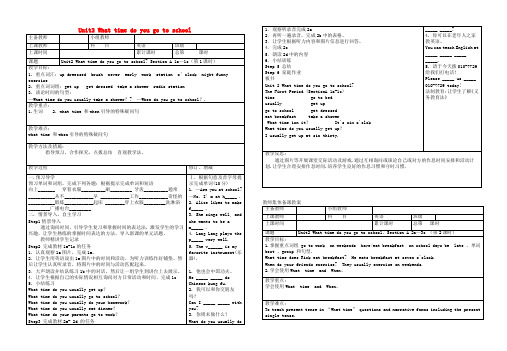
7. 3a: Use“always”,”usually”, or“never”to make sentences.
8. 3b :Let students write about something they do.
Step3 3c :1.make an interview 2. write a short passage
What time do you usually eat dinner?
What time do your parents go to work?
Step3 完成教材2a- 2d 的任务
1.观察听录音完成2a
2.再听一遍录音,完成2b中的表格。
3.让学生根据听力内容和图片信息进行回答。
4.完成2c
5.朗读2d中的内容
2. 重点词词组:get up get dressed take a shower radio station
3. 谈论时间的句型:
—Whattimedo youusuallytake a shower?? —When do you go to school?.
教学重点:
1.生词 2. what time 和when引导的特殊疑问句
1. 他也会中国功夫。
He__________do Chinese kung fu.
2. 我可以和你交朋友吗?
Can I__________with you?
3. 你周末做什么?
What do you usually do__________?
4. 你可以在老年人之家教英语。
You can teach English at____________________.
人教新目标英语七年级下册Unit 2 What time do you go to课堂思维导图笔记

adj. 最好的 adv. 最好地;最
My best friend is Lucy. Among all the fruits, I like apples best.
反:worst
最坏的/地
better
(good 的比较级)更好的
Section A 重点词汇
19. group n. 组;群
牙膏
toothbrush
牙刷
常见的可数名词单数变复数时不规则变化的名词有: man, woman, child, foot, mouse, tooth等。 我们可以用这样一句话来记忆这些单词“男女孩子的脚踩住老鼠的牙”
Section A 重点词汇
5. shower n. & v. 淋浴,(名)淋浴器
unusually
异乎寻常地
Section A 重点词汇
7. forty num. 四十
There are 40 students in Class One.
表示“几十”的数字都以-ty结尾。 词形特殊的有:twenty, thirty,
forty, fifty, eighty. four
Unit 2 What time do you go to school?
2012版人教新目标七年级英语下册课堂笔记
1. up
adv. 向上
Please lift your head up.
反义词:down get up
起床
stand up
起立
Section A 重点词汇
2. dress
What’s your job?
可数名词 近:work good job
幸运的事情;干得不错
人教版新目标七年级英语下册Unit2Whattimedoyougotoschool语法篇试题含答案

人教版新目标七年级英语下册Unit2Whattimedoyougotoschool语法篇试题学生通过本讲学习,能够掌握本单元的重点语法,并在综合能力上有一定的拓展。
一、what time与when1.what time翻译为“几点”问的是具体的时间,一般回答要具体到小时。
What time do you go to school?你什么时候/几点上学?I go to school at half past seven o’clock.我七点半去上学。
回答具体到点钟,且注意在几点前边的介词用at。
2.when也是对时间的提问,但与what time的区别是:用when提问,回答既可以是具体的时间,也可以是不具体的时间,如:in the morning,last year,in 1998等范围大的时间,例如:When does he take a shower?他什么时候洗澡?He takes a shower in the morning.他在早上洗澡。
也可用具体时间:I take a shower at 6 o’clock in the morning.我早上六点洗澡。
3. 问对方时间点只能用what time,如What time is it?二、频率副词的使用用法几个频率副词的用法★alwaysalways 意为“总是”,与进行时态连用时,可以表示赞扬,也可以表示讨厌等感情色彩。
e.g.(1)I shall always remember my first day at school. 我将永远记住我上学的第一天。
(2)He is always smoking. 他总是抽烟。
★usuallyusually可以指通常的动作,但是侧重已经形成的习惯,它是从已经形成的角度来说明动作。
e.g.(1)I usually do some shopping with my parents on Sundays. 我经常在星期天和我的父母一起去买东西。
人教版(新目标)初中英语七年级下册Unit 2
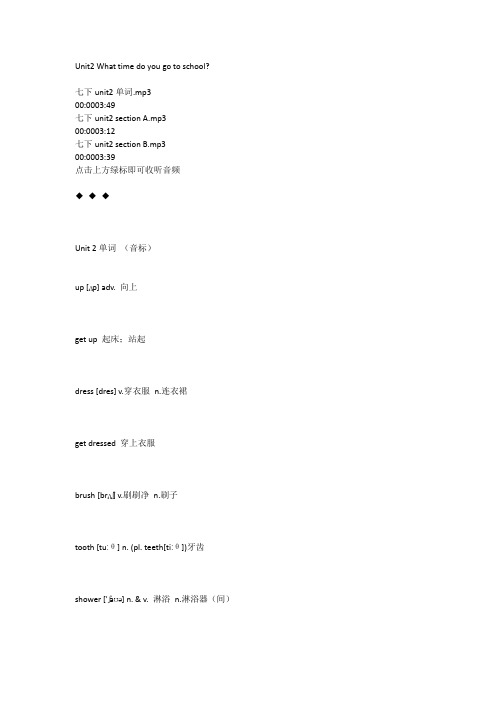
Unit2 What time do you go to school?七下unit2单词.mp300:0003:49七下unit2 section A.mp300:0003:12七下unit2 section B.mp300:0003:39点击上方绿标即可收听音频◆◆◆Unit 2单词(音标)up [ʌp] adv. 向上get up 起床;站起dress [dres] v.穿衣服n.连衣裙get dressed 穿上衣服brush [brʌʃ] v.刷刷净n.刷子tooth [tuːθ] n. (pl. teeth[tiːθ])牙齿shower ['ʃaʊə] n. & v. 淋浴n.淋浴器(间)take a shower 洗淋浴usually ['ju:ʒuəli] adv.通常地;一般地forty ['fɔ:(r)ti] num.四十wow [waʊ] interj.(表示惊奇或敬佩)哇;呀never ['nevə(r)] adv.从不;绝不early ['ɜːlɪ] adv. & adj.早(的)fifty ['fɪftɪ] num.五十job [dʒɒb], [dʒɑːb] n.工作;职业work [wɜːk] v. & n. 工作station ['steɪʃn] n.电(视)台;车站radio station 广播电台o'clock [ə'klɒk], [ə'klɑ:k] adv.(表示整点)……点钟night [naɪt] n. 晚上;夜晚funny ['fʌnɪ] adj.奇怪的;滑稽好笑的exercise ['eksəsaɪz] v. & n. 锻炼;练习on weekends (在)周末best [best] adj.最好的adv.最好地;最group [gruːp] n.组;群half [hɑːf], [hæf] n. & pron. 一半;半数past [pɑːst],[pæst] prep.晚于;过(时间)adj.过去的quarter ['kwɔː(r)tə(r)] n.一刻钟;四分之一homework['həʊmwɜː(r)k] n. 家庭作业do (one’s) homework 做作业run [rʌn] v. 跑;奔clean [kliːn] v.打扫;弄干净adj.干净的walk [wɔːk] n. & v. 行走;步行take a walk 散步;走一走quickly ['kwɪkli] adv. 很快地either ['aɪðə(r)], [ 'iːðə(r) ]adv.或者;也(用在否定词组后)either…or…要么……要么……;或者……或者……lot [lɒt], [lɑ:t] pron.大量;许多lots of 大量;许多sometimes ['sʌmtaɪmz] adv.有时taste [teɪst] v.有……的味道;品尝n.味道;滋味life [laɪf] n.生活;生命Rick [rɪk] 里克(男名)Jim [dʒɪm] 吉姆(男名)Scott [skɒt], [skɑ:t] 斯科特(男名)Tony ['təʊnɪ] 托尼(男名)unit2电子课本Unit2 知识梳理◆短语归纳1. what time 几点2. go to school 去上学3. get up 起床4. take a shower 洗淋浴5. brush teeth 刷牙6. get to 到达7. do homework 做家庭作业8. go to work 去上班9. go home 回家10. eat breakfast 吃早饭11. get dressed 穿上衣服12. get home 到家13. either…or…要么…要么…14. go to bed 上床睡觉15. in the morning/afternoon/evening 在上午/下午/晚上16. take a walk 散步17. lots of=a lot of 许多,大量18. radio station 广播电台19. at night 在晚上20. be late for=arrive late for 迟到◆用法集萃1. at + 具体时间点在几点(几分)2. eat breakfast/lunch/dinner 吃早饭/午饭/晚饭3. thirty/half past +基数词…点半4. fifteen/a quarter to +基数词差一刻到…点5. take a/an+名词从事…活动6. from…to…从…到…7. need to do sth 需要做某事◆典句必背1. —What time do you usually get up? 你通常几点钟起床?—I usually get up at six thirty. 我通常6:30起床。
人教版七年级英语下册第2单元What time do you go to school?第4课时PP

__√__ go to bed early ____ eat ice-cream
____ eat quickly
__√__ eat vegetables
__√__ play sports
__√__ take a walk
课堂导入 2b Tony and Mary are brother and sister. They have healthy and unhealthy habits. Who is healthier? Circle the healthy activities.
she goes to school at eight thirty. At twelve, she eats lots of fruit
and vegetables for lunch. After lunch, she sometimes plays
volleyball.
fruit:水果(名词), 指水果总称或同种类水 果时不加-s,指不同种类水果时要加-s。
__e_a_t _lo_t_s_o_f_f_r_u_it_a_n_d_v_e_g_e_t_a_b_le_s________
当堂练习
一、单项选择。 1. Tony doesn't have healthy lifestyle, his brother doesn't have a healthy lifestyle, ___C____.
thirty, I brush my teeth and then I go to bed.
课堂导入
Mary is my sister. She usually gets up at six thirty. Then she
always takes a shower and eats a good breakfast. After that,
人教新目标Go For It!(2012)初中英语七年级下册Unit 2 What time do
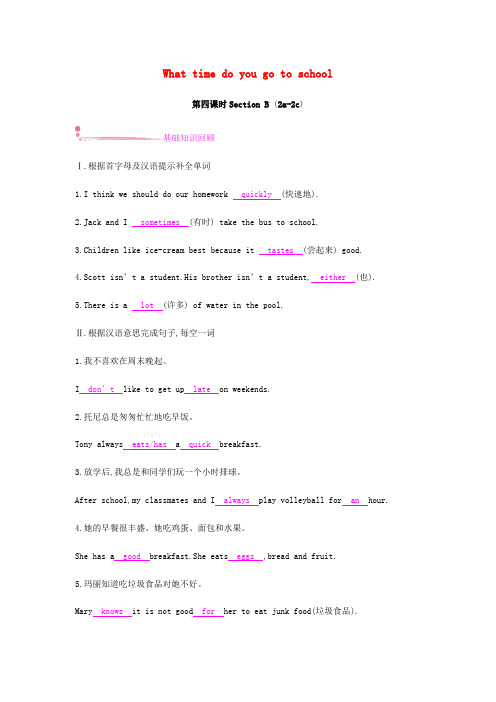
What time do you go to school第四课时Section B (2a-2c)基础知识回顾Ⅰ.根据首字母及汉语提示补全单词1.I think we should do our homework quickly (快速地).2.Jack and I sometimes (有时) take the bus to school.3.Children like ice-cream best because it tastes (尝起来) good.4.Scott isn’t a student.His brother isn’t a student,either (也).5.There is a lot (许多) of water in the pool.Ⅱ.根据汉语意思完成句子,每空一词1.我不喜欢在周末晚起。
I don’t like to get up late on weekends.2.托尼总是匆匆忙忙地吃早饭。
Tony always eats/has a quick breakfast.3.放学后,我总是和同学们玩一个小时排球。
After school,my classmates and I always play volleyball for an hour.4.她的早餐很丰盛。
她吃鸡蛋、面包和水果。
She has a good breakfast.She eats eggs ,bread and fruit.5.玛丽知道吃垃圾食品对她不好。
Mary knows it is not good for her to eat junk food(垃圾食品).Ⅲ.按要求完成句子,每空一词1.Dave usually takes a walk after dinner.(改为一般疑问句) Does Dave usually take a walk after dinner?2.She often goes to park on Sundays.(对画线部分提问) When does she often go to the park?3.Keke never eats vegetables for breakfast.(改为同义句) Keke doesn’t eat vegetables for breakfast.4.It is ten forty-five now.(改为同义句)It is a quarter to eleven now.5.When does Tony play sports?(改为同义句)What time does Tony play sports?Ⅳ.连词成句1.he,much,doesn’t,time,have,breakfast,for(.)He doesn’t have much time for breakfast.2.I,always,when,home,I,get,homework,my,first,do(.)I always do my homework first when I get home.3.weekends,either,TV,I,play,watch,on,games,or,computer(.)I either watch TV or play computer games on weekends.4.dinner,does,takes,she,after,walk,a,her,or,homework,usually(.) After dinner she usually takes a walk or does her homework.5.at,Anna,ten,to,goes,twenty,usually,bed(.)Anna usually goes to bed at ten twenty.综合能力提升Ⅰ.单项填空(C)1.What timeMr.and Mrs.Browndinner?A.do;hasB.does;hasC.do;haveD.does;have(B) 2.My mother seldomat 5:30 p.m.A.gets to homeB.gets homeC.get to homeD.get home(B) 3.My sister doesn’t like meat.I don’t like meat,.A.alsoB.eitherC.tooD.well(A) 4.I sometimes play the violin forhour.A.half anB.an halfC.a halfD.half a(D) 5.He eitherfootball orwalks in the evening.A.play;takeB.plays;takeC.play;takesD.plays;takesⅡ.用方框中所给词的适当形式完成短文Nowadays teenagers(青少年) need to have a healthy habit.My son is in Grade Eight.During summer holidays he 1.has some bad habits.In the morning,he always gets up 2.at ten o’clock.He 3.never eats breakfast.Because lunchtime is coming.He doesn’t eat any food for many 4.hours .So he is hungry and he eats more and 5.quickly .And he doesn’t like vegetables or fruit.He usually eats instant noodles(方便面).After lunch he 6.either watches TV 7.or plays computer games.He never 8.takes a walk.He doesn’t play sports.So he is heavy.At seven in the evening,he begins 9.to do his homework until ten.His eyesight(视力) is poor.He 10.goes to bed at midnight(半夜).。
人教版七年级英语下册Unit2_知识点思维导图(可编辑版)

人教新目标版七年级下册Unit 2 What time do you go to school?1、get up起床go to bed 上床睡觉Rick is a students. he usually _____at eight o'clock in the morning.A. goes to bedB. goes to schoolC. goes to the bedD.goes to the school2、go to schoolgo to school 侧重功能go to the school 侧重地点in hospitalin the hospitalat tableat the table---Would you like to come to my party this afternoon?---I'd like to, but my mother is ill in ___hospital. I will go to ___ hospital to see herA./ ; aB. a; theC. the; theD./; the3、get dressedget dressed in +衣服或表示颜色的词dress sb. 给...穿衣服He gets____quickly,and then_____ his brother.A. dresses;dressedB. dressed; dressesC. dresses; dressesD. dressed; dressed4、brush teethteeth 是tooth 的复数形式Do you know how many____ you have?A. toothsB. toothesC. teeth5、at , in , onat 后接具体的时刻at five o'clockat noonin 在月、季、年、早、中、晚前面,(早、中、晚前加the)in Mayin springin the morningon 表示某一天,或某一天的早、中、晚on Mondayon Children's Dayon the afternoon of July 8th---When is the Art Festival party?---It's ___seven o'clock ___the evening of November 18th.A. at; inB. at; onC. on; inD. in; onWe usually have the first class ____ 8:00 in the morning.A. ofB. inC. onD. at6、... time for ... 做...的时间It's time for.../It's time to do... 到该做...的时候了It's time for sb. to do sth.7、go to work 去上班go to schoolgo to bed8、be late for.. ...迟到Don't be late______class! We must be on time.A. forB. toC. in9、what time 与whenwhat time 更具体---____is your birthday and ___ do you have a birthday party?---Next Friday and at 6:00 in the afternoon.A. When; what timeB. What time; whenC. What; whenD. When; what time10、时间表达整点法整点数+(o'clock)顺读法6:30为six thirty4:05为four o five逆读法8:10 为ten past eight1:30 为half past one5:56 为four to six10:15 为a quarter past ten(quarter 意为一刻钟、四分之一)5:45 为a quarter to six11、频度副词12、half复数为halveshalf past+one/two/three...half an hour 半个小时one hour and a half = one and a half hours13、take a walk 散步相当于take walksHis grandfather often______after dinner.A. take a walkB. takes a walkC. go a walkD. goes a walk14、sometimes用于How often 的提问He sometimes takes a walk with his mom.(对sometimes 提问)_____ ______ _______ he take a walk with his mom?He usually goes to school by bus, but ____ he rides a bike.A. sometimeB. some timeC. sometimesD. some times15、either...or...意为“非...即...”连接两个并列主语,谓语动词和最近的主语一致-“就近原则”Either she or I am right---Either you or she ____on duty today. Don't forget it.---OK.I won't.A. isB. amC. areD. beeither 常用于否定句,意为“也不”I don't like the green one either.either 用作代词,意为“两者中任何一个”---Would you like some orange juice or coffee?---______. I don't mindA. NeitherB. BothC. Either16、lots of= a lot of 大量修饰可数名词复数和不可数名词lots of peoplemany修饰可数名词复数Do you have many books?much修饰不可数名词I spend much time doing my homework every day.I have _____work to do every day.A. a lotB. lots ofC. a lots ofD. many。
- 1、下载文档前请自行甄别文档内容的完整性,平台不提供额外的编辑、内容补充、找答案等附加服务。
- 2、"仅部分预览"的文档,不可在线预览部分如存在完整性等问题,可反馈申请退款(可完整预览的文档不适用该条件!)。
- 3、如文档侵犯您的权益,请联系客服反馈,我们会尽快为您处理(人工客服工作时间:9:00-18:30)。
自主合作导学案
科目English 课题Unit 2 What time do you go to school? 时间 3.8 设计人课时Period 4 序号9
教学目标1.掌握P10-11的单词;
2.掌握past及to在时间表达中的应用。
教学重难点掌握past及to在时间表达中的应用。
导学过程备注补充【新课导入】复习时间的表达。
【自主学习】看图写出下列短语。
【合作探究】
★具体时间的表达:
A.整点的表达:整点+o´ clock.
B.其它时间用基数词可直接表达:如:7:05 seven five
◆过、差式,即几点差几分,几点过几分。
(以30分为界限)
1:25 twenty-five past one 2:30 half past two
4:38 twenty-two to five
◆ 12小时 6:00 a.m. 8:20 p.m.
◆ 24小时制 22:15 13:00
★pairwork 根据上面图片的内容,小组编对话
——What time do you usually…?
——I usually… at…
——What time does he usually…?
——He usually …(V-s) at…
★I usually go to school at 7:00.
否定句:I don’t go to school at 7:00.
一般疑问句:——Do you go to school at 7:00.
——Yes, I do / No, I don’t.
【课堂检测】一.完成下列句子。
1. 我早上5点起床。
I at 5 in the .
2. Mary 晚上7点做作业。
Mary at 7 in the .
3. 你什么时候回家? When do you ?
4. 我下午6点回家。
I at 6 in the .
5. Tony什么时候睡觉。
When Tony _ ?
6. 他晚上9点睡觉。
He _ at 9 in the evening. 二.书面表达。
I am a student. Every day I up at 6:00. Then I eat my at about 6:30. I to school at 6:45.I often have lunch at 12:00. I often basketball before I home. I get home at 7:00. 7:30 I have my supper. At night, I TV at 8:00.Then I my homework. I to bed at 10:00.
【课堂小结】What have you learned from this class?
【课后作业】
1. 抄写P10-11的单词。
2. 完成资源与学案P11Ⅳ.汉译英。
【教学反思】。
